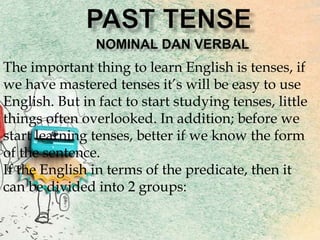Report
Share

Recommended
simple past tense adalah tense yang digunakan untuk menerangkan sesuatu kejadian atau aktifitas yang terjadi di masa lalu atau sudah lewat, tenses ini menggunakan kata kerja (verb) bentuk ke-2 dan menggunakan to be (was ataau were) untuk bentuk nominal (ANA).Cara mudah menguasai past tense bahasa inggris

Cara mudah menguasai past tense bahasa inggrisLEC BALI - Kursus Les Bahasa Inggris Private Gratis di Denpasar Bali
More Related Content
What's hot
simple past tense adalah tense yang digunakan untuk menerangkan sesuatu kejadian atau aktifitas yang terjadi di masa lalu atau sudah lewat, tenses ini menggunakan kata kerja (verb) bentuk ke-2 dan menggunakan to be (was ataau were) untuk bentuk nominal (ANA).Cara mudah menguasai past tense bahasa inggris

Cara mudah menguasai past tense bahasa inggrisLEC BALI - Kursus Les Bahasa Inggris Private Gratis di Denpasar Bali
What's hot (20)
Similar to Bagas 2
Similar to Bagas 2 (20)
Passive voice, Relative Clauses, Causative, and Subordinating Conjungtion. 

Passive voice, Relative Clauses, Causative, and Subordinating Conjungtion.
Present Simple, present continuous & present perfect 

Present Simple, present continuous & present perfect
More from farisdilan
More from farisdilan (12)
Recently uploaded
Recently uploaded (20)
Micro-Scholarship, What it is, How can it help me.pdf

Micro-Scholarship, What it is, How can it help me.pdf
HMCS Vancouver Pre-Deployment Brief - May 2024 (Web Version).pptx

HMCS Vancouver Pre-Deployment Brief - May 2024 (Web Version).pptx
Salient Features of India constitution especially power and functions

Salient Features of India constitution especially power and functions
Kodo Millet PPT made by Ghanshyam bairwa college of Agriculture kumher bhara...

Kodo Millet PPT made by Ghanshyam bairwa college of Agriculture kumher bhara...
Fostering Friendships - Enhancing Social Bonds in the Classroom

Fostering Friendships - Enhancing Social Bonds in the Classroom
Plant propagation: Sexual and Asexual propapagation.pptx

Plant propagation: Sexual and Asexual propapagation.pptx
Unit 3 Emotional Intelligence and Spiritual Intelligence.pdf

Unit 3 Emotional Intelligence and Spiritual Intelligence.pdf
On National Teacher Day, meet the 2024-25 Kenan Fellows

On National Teacher Day, meet the 2024-25 Kenan Fellows
Jual Obat Aborsi Hongkong ( Asli No.1 ) 085657271886 Obat Penggugur Kandungan...

Jual Obat Aborsi Hongkong ( Asli No.1 ) 085657271886 Obat Penggugur Kandungan...
ICT Role in 21st Century Education & its Challenges.pptx

ICT Role in 21st Century Education & its Challenges.pptx
General Principles of Intellectual Property: Concepts of Intellectual Proper...

General Principles of Intellectual Property: Concepts of Intellectual Proper...
Bagas 2
- 1. The important thing to learn English is tenses, if we have mastered tenses it’s will be easy to use English. But in fact to start studying tenses, little things often overlooked. In addition; before we start learning tenses, better if we know the form of the sentence. If the English in terms of the predicate, then it can be divided into 2 groups:
- 2. 1. Verbal sentence Where the predicate is verb. For example: She studies hard every day. ( Dia belajar giat setiap hari.) I like to listen the jazz music. ( Saya suka mendengar music jazz.) We watch television together.( Sami menonton tv bersama. ) ‘studies’, ‘like’, ‘watch’, etc are verb. If the views of its kind, verbal sentences can be classified into: a. Positive verbal sentence This sentence is often also called affirmative sentence, in general, this phrase is used to declare an event or action. For example: They walk to the school.(Dia berjalan kesekolah.) I helped my mother after school.(Saya membantu ibuku setelah sekolah) He take some pictures at there.(Dia mengambil beberapa foto di sana)
- 3. b. Negative verbal sentence This will be negative sentences by adding 'do / does / did + not' before verb. For example: The do not (don’t) walk to the school. (Mereka tidak berjalan kaki ke sekolah.) I did not (didn’t) help my mother after school. (saya tidak membantu ibu sayang setelah sekolah.) He does not (doesn’t) take some pictures at there. (Dia tidak mengambil beberapa gambar disana) c. Interrogative verbal sentence Interrogative verbal sentences are form by putting ‘do/does /did’ at the beginning of sentence. For example: Do they walk to school?(apakah mereka berjalan ke sekolah?) Did I help my mother after school ?(apakah saya membantu ibu saya setelah sekolah? Does he take some picture at there?(apakah dia mengambil beberapa gambar dseblah sana ?)
- 4. 2. Nominal sentence Nominal sentence is a sentence that has predicate not a verb, but can be an adjective, noun or adverb, then the nominal sentence should be inserted auxiliary verb to be like 'is, am, are, and were the resource persons / was (which is used in the past ) He / She / It = Is I = Am You/ They / we = Are For example: She is an actress in Hollywood. (Dia adalah seorang artis Hollywood) They are clever student. (Mereka adalah siswa-siswa yang cerdas) If I were a boy, I will be able to beat you. (jika saya seorang laki- laki, saya akan dapat mengalahkanmu.) If we view of its kind, nominal sentences can be classified into:
- 5. a. Positive nomnal sentence This sentence is often also called affirmative sentence, in general, this phrase is used to situation, position or rank. For example: Santana is a beatifull girl.(Santana adalah seorang gadis cantik.) They are students in elementary school. (Mereka adalah siswa sekolah dasar.) He is my lecture. (Dia adalah dosen saya.) a. Negative nominal sentence This will be negative sentences by adding ‘not' after to be. For example: Santana is not a beautiful girl.(Santana bukan seorang gadis cantik.) They are not students in elementary school.(Mereka bukan siswa sekolah dasar.) He is not my lecture. (Dia bukan dosen saya.)
- 6. b. Interrogative nominal sentence Interrogative nominal sentences are form by putting ‘to be’ at the beginning of sentence. For example: Is Santana a beautiful girl?(Apakah Santana seorang gadis cantik?) Are they students in elementary school.(apakah mereka siswa sekolah dasar?) Is he my lecture?(apakah dia dosen saya?)